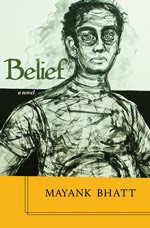 |
| Joyce Wayne |
Saturday, August 31, 2013
The Cook’s Temptation - Joyce Wayne
Set in Victorian
England – an era that Joyce finds fascinating – the novel is about Cordelia
Tilley, a strong-minded Jewish woman’s dilemma: to be true to herself versus her
desire to be accepted in the English society.
“It’s a
story of an outsider trying hard to adjust and be a part of her new
environment,” Joyce explains. “In that sense, the novel will find resonance
with immigrants who experience such transition. The adjustment is easy
initially but becomes difficult as time passes, and this is because the society
is unwilling to go beyond superficial acceptance.”
The Cook’s Temptation brings to life the complexities of
Victorian life, first in County Devon and then in London’s East end.
“I’m
fascinated by the Victorian era and especially fiction from that era. George
Eliot is one of my favourite authors. I also like Sarah Walters and Michael
Cox, both of whom wrote about the Victorian era. And you tend to write what you
read,” Joyce says.
The novel
portrays one woman’s life, class conflict, religious intolerance, suspicion and
betrayal. Cordelia is the daughter of a Jewish mother and an Anglican father.
Her mother has groomed her for a life in English society while her father, a
tough publican, has shown no tolerance for his wife’s social climbing or the
conceits of their perspicacious daughter.
Cordelia’s mother dies from typhoid
fever, she tries to run the family’s establishment, she falls prey to a local
industrialist, she gives birth to a son, she is tormented by her husband and
his family. Finally, she is rescued by suffragette friends and sets off to
start a new life in London.
“The idea
of the novel came when I visited a graveyard at Holsworthy village north of
Devon and I saw a grave with the name Cordelia on the stone. It was then that I
decided that I’d write about Cordelia,” Joyce says.
“The book is also about the
many layered British society, the complicated relationship that an outsider has
with a society. It also explores the not-so-subtle antisemitism of the British
society in that era.”
The Cook’s Temptation is about one woman’s life, class
conflict, religious intolerance, suspicion and betrayal. It’s about a woman who
is unpredictable, both strong and weak willed, both kind and heinous, victim
and criminal. It’s a genuine Victorian
saga, full of detail, twists and turns, memorable scenes, full of drama and
pathos.
According
to Joyce, “Cordelia isn’t just one woman, she’s many women.”
After
reading the manuscript of The Cook’s
Temptation, author Jasmine D’Costa, who has been instrumental in turning many
newcomers to Canada into writers, publicly applauded Joyce. She wrote: “Reading
books written by people I know is always a shock. I read Joyce Wayne’s
manuscript of The Cook’s Temptation
soon to be out in print, and discovered a new person. Wow what a story she
wove! And from where did all those sex scenes come from? I am hoping it is
purely from imagination.”
Joyce has
an MA in English literature and has taught journalism at Sheridan College,
which is where I met her in 2009. She revived my interest in literature, and
for the first time, under her guidance, I formally studied literature.
We
argued intensely over what constituted good literature, and I remember an
especially intense argument over Lawrence Hill’s The Book of Negroes. She was convinced the book was a modern
Canadian classic, and I was niggardly in praising it because I felt it was similar
(in theme) to Alex Haley’s Roots.
I
re-read Hill’s novel recently when my son Che said he enjoyed the book. And
I must admit Joyce was, indeed, right. The book is uniquely Canadian. I didn’t get the quintessential 'Canadian-ness'
of the novel when I read it in 2009 because I wasn’t familiar with Canada.
Joyce is a
winner of the Diaspora Dialogues contest for fiction, and has been awarded the
Fiona Mee Award for literary journalism. She is the co-writer of the
documentary film, So Far From Home in
2010, a film about refugee journalists persecuted for their political views,
and various of her other works have been published in Parchment, Golden Horseshoe Anthology, Canadian Voices, TOK6.
Subscribe to:
Post Comments (Atom)




No comments:
Post a Comment